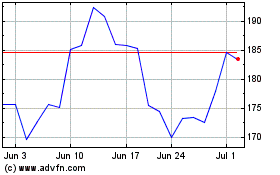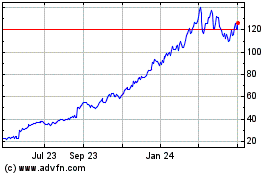At Earnings Season's End, Weak Dollar Means Strong Results
May 24 2011 - 4:23PM
Dow Jones News
As earnings season draws to a close, U.S. companies' upbeat
results have the weak dollar to thank.
Large U.S. companies with sizeable overseas operations reported
that the dollar's slide against other currencies helped them, as
money earned abroad was converted into more dollars when
repatriated back to the U.S.
Currency translation benefits could be seen across the board for
U.S. exporters. Campbell Soup Co. (CPB) reported on Monday that its
earnings were up 11% for the quarter. That included the impact of
exchange rates, which contributed to both a 7.9% rise in profits
for the baking and snack businesses and a 7% lift in international
soup, sauces, and beverage revenue.
Clothing retailer Abercrombie & Fitch Co. (ANF) on Wednesday
also reported a higher-than-expected profit for the quarter, citing
a higher gross margin of 62.7% due to currency benefits, among
other factors.
For S&P 500 companies, "earnings definitely came in much
stronger than expected for the first quarter and one of the factors
was positive currency translation," said Alexander Young,
international equity strategist at Standard & Poor's. "Clearly
the weak dollar helped corporate America exceed consensus
earnings."
The largest American companies fared better in the first quarter
of 2011 than investors expected. Analysts' consensus forecasts put
earnings growth at 13% for S&P 500 companies heading into the
quarterly earnings season; by the end of the reporting period, the
analysts were expecting 19% earnings growth, according to Consensus
S&P's CapIQ.
The dollar index traded at 75,887 in New York on Tuesday. Since
the Federal Reserve began pumping money into the U.S. economy as
part of its quantitative-easing program, slated to end in June, the
dollar has been falling, weighed by supply.
U.S. regulations don't require companies to report their
international revenue separately, and only half the companies in
the S&P 500 do so. For those companies, Europe tends to be the
biggest foreign source of revenue, Young said.
Sectors such as energy, materials, and industrials, which all
reported good earnings this quarter, also tend to have the largest
global footprints, Young said.
The current quarter, which will finish at the end of June,
should also show positive currency effects for American companies,
Young said, noting that while the trade-weighted dollar index has
had an average level of 75 during the quarter, companies will be
comparing their results to the second quarter of 2010, when the
index averaged 84. "This positive currency translation is
persisting," he said.
While the dollar's long-term malaise has been good for companies
that sell American products abroad, the same economic forces are
pushing up prices at home, which can have a mixed effect on
companies' U.S. operations. "A weak dollar promotes inflation in
the U.S. because it lowers Americans' purchasing power," Young
said.
-By Chana R. Schoenberger, Dow Jones Newswires; 212-416-4803;
chana.schoenberger@dowjones.com
Abercrombie and Fitch (NYSE:ANF)
Historical Stock Chart
From Jun 2024 to Jul 2024

Abercrombie and Fitch (NYSE:ANF)
Historical Stock Chart
From Jul 2023 to Jul 2024
